|
|
|
Sort Order |
|
|
|
Items / Page
|
|
|
|
|
|
|
| Srl | Item |
| 1 |
ID:
153295
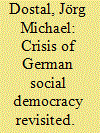

|
|
|
|
|
| Summary/Abstract |
This article analyses the dramatic electoral decline of German social democracy since 2003. It argues that the SPD's decision, under the leadership of former Chancellor Gerhard Schröder, to engage in welfare state retrenchment and labour market deregulation during the ‘Hartz reforms’ (2003–05) demoralised the SPD electorate. The SPD subsequently lost half of its former electoral coalition, namely blue-collar voters and socially disadvantaged groups, while efforts to gain access to centrist and middle-class voters have failed to produce any compensating gains. While the SPD's decline from a large to a mid-sized party is part of a larger transformation of the German party system, no political recovery is possible for social democracy without a fundamental change of strategy, namely efforts to regain former voters by offering credible social welfare and redistributive policies. The SPD will not be able to delegate such policies in a ‘convoy model’ to other parties, such as the Left Party; nor will a modest ‘correction’ of the earlier course, such as has been attempted since 2009 under the leadership of current party chairman Sigmar Gabriel, be sufficient to recover lost electoral ground.
|
|
|
|
|
|
|
|
|
|
|
|
|
|
|
|
| 2 |
ID:
167905
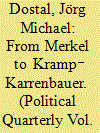

|
|
|
|
|
| Summary/Abstract |
Germany's Christian Democrats have started preparing for the time after Angela Merkel. After ten years as German chancellor facing a weak opposition, Merkel unexpectedly split the country in late 2015 and early 2016 because of her ‘open border’ policies that allowed more than 1 million refugees and migrants to rapidly enter Germany. Her management of the subsequent crisis was largely considered a failure and her party suffered a series of dramatic election defeats. Reacting to the negative electoral feedback, and in particular the breakthrough of the rightist and anti‐immigration Alternative for Germany (AfD), the Christian Democratic Union organised an intra‐party contest to replace Merkel as party leader. Three candidates with different political profiles, Annegret Kramp‐Karrenbauer, Friedrich Merz and Jens Spahn, contested the election. By voting for Kramp‐Karrenbauer, the CDU membership voiced support for maintaining a large‐scale political coalition based on efforts to find compromises between different party wings and social and cultural interests.
|
|
|
|
|
|
|
|
|
|
|
|
|
|
|
|
| 3 |
ID:
156776
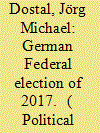

|
|
|
|
|
| Summary/Abstract |
The 2017 German federal election delivered dramatic electoral decline of the two traditional main parties, the Christian Democrats (CDU/CSU) and the Social Democratic Party (SPD), who had governed Germany in a ‘grand coalition’ government since 2013. The main reason for this outcome was the decision by Chancellor Angela Merkel to open Germany's borders for refugees and migrants, an unprecedented policy that abandoned border controls and remained in place between September 2015 and March 2016. This article focuses on how the refugee and migration problem subsequently turned into a wedge issue, splitting most German political parties and handing a major election victory to the main critics of Merkel's decision, namely the rightist Alternative for Germany (AfD) and the right-wing liberals of the Free Democratic Party (FDP). Rather than explaining these developments in isolation, the article highlights how past welfare state retrenchment and fear over future economic prosperity make significant groups of the electorate, including former supporters of left-of-centre parties, lose confidence in the ability of the political system to deliver stability and social integration.
|
|
|
|
|
|
|
|
|
|
|
|
|
|
|
|
| 4 |
ID:
174678
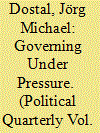

|
|
|
|
|
| Summary/Abstract |
The global threat of the coronavirus pandemic has forced policy makers to react quickly with totally new policy‐making approaches under conditions of uncertainty. This article focuses on such crisis‐driven policy learning, examining how the experiences of China and South Korea as early responder states influenced the subsequent coronavirus crisis management in Germany. The first reaction of the German core executive was the quick concentration of decision‐making power at the top of the political hierarchy. Asserting the prerogatives of the executive included the radical simplification of the relationship between politics, law and science. State actors took emergency measures by recourse to a single piece of legislation—the ‘infection protection law’ (Infektionsschutzgesetz)—overriding other elements of the legal order. They also limited the government’s use of scientific expertise to a small number of advisors, thereby cutting short debates about the appropriateness or otherwise of the government’s crisis measures. Finally, German actors failed to understand that some of the earlier Chinese and Korean responses required a precondition—namely public willingness to sacrifice privacy for public health—that is absent in the German case.
|
|
|
|
|
|
|
|
|
|
|
|
|
|
|
|
| 5 |
ID:
155420
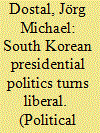

|
|
|
|
|
| Summary/Abstract |
The impeachment of President Park Gyeun-hye on 10 March 2017 saw South Korean politics enter a period of crisis. Her removal from office, the result of an unprecedented mass movement of citizen protests, provided a springboard for the subsequent success of the liberal candidate, Moon Jae-in, in the presidential election of 9 May 2017. This article suggests that political change in South Korea is only possible if actors move beyond the politics of personality, and tackle the structural reasons for the policy failures of recent times. Further, if democracy, a humane economic system and responsive political institutions are going to be developed and nourished, the country's ‘imperial presidency’ needs to be reformed. In particular, the current ‘winner-takes-all’ politics, with the presidency as the main locus of power, needs to be reformed in ways that promote a more balanced political system, increasing the influence of other actors and institutions.
|
|
|
|
|
|
|
|
|
|
|
|
|
|
|
|
|
|
|
|
|